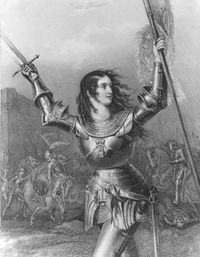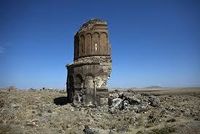Siege of Orléans
| Siege of Orléans | |||||||||
|---|---|---|---|---|---|---|---|---|---|
| Part of the Hundred Years' War | |||||||||
 "You cannot break zis wall!" |
|||||||||
|
|||||||||
| Belligerents | |||||||||
| Poutine-Hungry Frenchies | Power-Hungry Englishmen | ||||||||
| Commanders and leaders | |||||||||
| Joan of Arc | Earl John Talbot | ||||||||
| Strength | |||||||||
| A few poorly armed peasants, a big wall and God | A lot of powerfully armed soldiers, bigger catapults than the French wall and a whole lot of lack of common sense | ||||||||
“Orleans? I love that pizza place!”
– Oscar Wilde on Siege of Orléans
“Orleans? Isn't that the place with lots of flooding?”
– Captain Oblivious on Siege of Orléans
The Siege of Orléans was a battle between the French and the English during the Hundred Years' War, where the English were trying to destroy the French's lovely city of high tax rates and low humor. Joan of Arc, an earlier form of Abraham Lincoln that was treated badly because of her feminine gender and her obsessive religious ideas about God and the Virgin Mary, happened to be passing by before the Siege began. The outcome of the Siege is what made Joan loved by what was left of Orléans, and made the English Generals beat themselves up for losing to a bitch like her.
Start of the Siege[edit | edit source]
It was 1428, and the English - after centuries of warring against the French - decided to war against the French. Their reasoning? It would be best to achieve a victory in the 14th century to make up for losses in the 13th, and so on and so forth. King Henry V seemed to have wrapped up the war in 1415 at Agincourt, but had died in 1422 with the job only half done. His son Henry VI had become King of both England and France but as he was only eight at this time, he had enough trouble controlling his own bowels, let alone two countries. So in effect the government was run by his uncles, John, Duke of Bedford and Humphrey, Duke of Gloucester. It was they who decided that the French needed a thorough kicking and organised the attack on the city of Orléans.
The stated plan of the English was "Hey, let's beat them the only way we know how... Bomb them with catapults until they give up!", to which the French, unaware of what they had just said, noticed they were being surrounded by catapults stolen from the now conquered French villages and towns surrounding Orléans. Joan wondered what idiot would place weak villages in perfect vantage points towards Orléans, and decided that the Almighty God and herself can be the new leader to fix the mismanagement and defeat the English.
However, the French Dauphin, Charles, didn't care about the towns being conquered because they were too focused on their last strongholds, Orleans (They didn't know what the cities had as an advantage in a fight along with catapults - lots and lots of idiots), their capital Paris and their "Ile de Paradise" which was an island that was used as a getaway and was very expensive, but all proceeds go to the Dauphin. They noticed when the English had an army of around ten thousand people hitting their friends with clubs, and became paranoid, and told their favourite tool, Joan of Arc, to somehow convince the residents of Orleans to come to Paris and provide more tax money for the Dauphin. Joan thought her idea to defeat them with God was a better idea. She had a plan that would almost surely be certain to not really work.
Joan's (God's) plan[edit | edit source]
God was up in the heaven's during the ordeal, and became mildly curious of this plan Joan was speaking of. He decided that helping her with this plan could make the English atheists convert to Catholicism and more people will pray for him without him proving that he exists. In Joan's mind, she thought that God would give her an idea. However, none came when the English started saying their regular speeches to the French saying that "Resistance is futile" and "There is no hope for you", but the French couldn't understand a word they were saying and didn't care either. Joan had an idea from this mix of languages; she would draw them to the other wall of Orléans by saying a bunch of English words she heard them say in a large speaker horn. The English heard "All your base are belong to us" and were confused by the awful English, but decided that joining their brethren Englishmen on the other side could help them defeat the already failing French. Joan set many soldiers to the towers to shoot a volley of arrows when the time came that the English arrived to the other wall, but when they did, the volley didn't do much since there were almost no French soldiers in the first place. Talbot, the English earl sent to lead the invasion, laughed at their stupidity and claimed that the French couldn't shoot for shit. He did move around to avoid getting struck, however. Because of the French soldiers' poor aim, they fired an arrow 2 feet to the left of Talbot and he dodge 2 feet to the left to avoid the arrow in case it's heading directly for him, and he was struck. He gasped and sputtered blood, and said that being beaten by a French soldier disgraced him, and quickly yelled at the nearest English soldier for killing their leader. The soldier was subsequently clubbed to death.
In the meantime, Joan was upset that her plan didn't really work, and knew that once the English shot a volley of arrows, it would all over. She decided to throw in the towel and ditch the city on the wall that was free before the city went to hell.
Outcome[edit | edit source]
Joan was about to leave Orléans, but then the Virgin Mary and God supposedly said to her a divine message: <In french> "Hey, if you stay, I'll help kill 'em for you" to which Joan was amazed that God would actually help her. She was so proud by this that she went to the front of the battle in the later years of the war, believing God was with her. She was taken, held captive and burned to the stake the next day.
In Orléans, the citizens were becoming distressed at this awful occurrence that happened by them, so Joan assured them that they will be okay if they go and fight the English head on with pitchforks and weak utensils. The soldiers were also sent to do this, and so they went on a suicide mission to save themselves, believing God was with them all. By the time they reached the English, Joan watched and the pitchforks turned to swords and shovels turned into maces; leather turned into steel and hair turned into a plate helm. They were heavily armed and doing well, but they had the same armour and weapons the English had, albeit without training or numbers. They battled and the French were all killed (except Joan) and the English still had a fair number to them. One soldier declared that they won, and headed to the wall to break it down. It crumbled and collapsed, but landed on all of the English soldiers and killed them all. Joan, still inside the city, was ecstatic and thanked God, but looked around and found that she won for no one. She left Orléans in a slump, stating that she should find a new God.
Aftermath[edit | edit source]
When the English generals heard that the battle was lost and won, they realized that God obviously helped to defeat the English, but also realized that the city was empty, which also meant they beat God, which would be theoretically impossible if he existed. The generals were confused by this statement and they stayed atheists and no one was converted. God was angry at this, but thought of an idea to create a New Orleans Sometime in the future to recreate the events and try to convert people again. This plan didn't work, however, since the only thing to happen to the new city was to have a lot of floods due to being placed next to Atlantis.
The French Dauphin was happy by the outcome since he didn't have to pay for the citizens health care and still technically owned the city so he still had a little more influence. The ruins of the city became a second Jerusalem, by the idea that God's power still resided in that place.

